THE OUTLINE OF
PARAPSYCHOLOGY
Revised Edition
Jesse Hong Xiong

Copyright 2010 by
University Press of America, Inc.
4501 Forbes Boulevard
Suite 200
Lanham, Maryland 20706
UPA Acquisitions Department (301) 459-3366
Estover Road
Plymouth PL6 7PY
United Kingdom
All rights reserved
Printed in the United States of America
British Library Cataloging in Publication Information Available
Library of Congress Control Number: 200936402
ISBN: 978-0-7618-4945-2 (paperback : alk. paper)
eISBN: 978-0-7618-4946-9
 The paper used in this publication meets the minimum
The paper used in this publication meets the minimum
requirements of American National Standard for Information
SciencesPermanence of Paper for Printed Library Materials,
ANSI Z39.48-1992
Contents
1. The Prehistoric Period of Parapsychology
(Before Mid 18th Century)
2. The Rudimental Period of Parapsychology
(Mid 18th Century1882)
Preface to English Version
Since I started gathering material for writing this book, I have been wondering why parapsychology has always been kept away from mainstream science, despite plenty of evidence have accumulated for more than 100 years. Further, many parapsychology phenomena have survived various researches and experiments, and many surveys and polls have shown that believers outnumber skeptics by a large margin.
Another question I have been wondering is why some of the aggressive opponents to parapsychology come from religious people, since both religions and some study tasks of parapsychology focus on supernatural realm.
Gradually, I think I understand: parapsychology has a different philosophical background from the existing science and religions. Parapsychology may dramatically affect the existing science framework and religion faiths, and change peoples outlooks on the world and life.
Generally speaking, secularists, including many science personalities, believe in materialism and atheism. The ecclesiasticists of most religions believe in an almighty, transcendent, personal God. Most of meditation practitioners, who pursue supernatural power and spiritual experience, believe in pantheism. For example, the ecclesiasticism of the Christianity is typical of centering around an almighty, transcendent, personal God; however, mystics, the meditation practitioners in Christianity tradition, call themselves neoplatonists, that is, pantheists. Cabalism in Judaism, Sufism in Islam, Taoism in China, many schools of Buddhism and Indian religions, New Age Movement, etc., which favor supernatural power pursuit and spiritual experience, all are pantheism.
According to the current Encyclopaedia Britannica (online), pantheism is the doctrine that the universe conceived of as a whole is God and, conversely, that there is no God but the combined substance, forces, and laws that are manifested in the existing universe. According to Wikipedia, the free encyclopedia, pantheism (Greek: (pan) = all and (theos) = God) literally means God is All and All is God.
In materialism, matter is believed to be the only entity, while consciousness and spirit are functions acquired only after matter develops into a life form. The ecclesiasticisms of most religions believe that an almighty, transcendent, personal God is the origin and creator of the universe. The ecclesiasticism of Christianity calls He God; the ecclesiasticism of Judaism calls He Yahweh; the ecclesiasticism of Islam calls He Allah, and so on. Pantheism posits that there is an innate conscious energy before the birth of the physical universe, and the physical universe is the product of self-action of the innate conscious energy. In ancient China, the innate conscious energy was called Tao; in ancient India, it was known as Brahma; neoplatonists call it the Absolute One; Cabalists call it Light or Wisdom Light; Sufis call it Wujud (Being); New Agers call it All That Is; etc. Personally I think the concept of imaginary time put forth by Stephen W. Hawking and Jim Hartle, together with the observational theory in quantum mechanics, Alain Aspects spooky action at a distance experiments, the hypotheses of dark matter and dark energy, etc., have opened up the way to scientifically understand the innate conscious energy.
Materialists argue that God or god(s) are nothing but the product of peoples imaginations and wishes. The ecclesiasticists of most religions worship an almighty personal God as the lord of all; moreover, the God is thought to be transcendent and there is an impassable fissure between the God and human beings and all things on earth. Pantheists recognize the existence of personal discarnate entities and more advanced lives; nevertheless, they suggest that the highest and most basic existence is not personal but the innate conscious energy, that the energy fills all people, all animals, all plants, and all matters, and that everyone and everything is divine if the highest and most basic existence, the innate conscious energy, is considered the Divinity. Thus, in materialism, the universe is fortuitously formed by random motion of matter; in the ecclesiasticisms of most religions, the universe is like a giant company directed by a personal God like CEO; in pantheism, the universe is more like a gigantic stock market taking all intents in it, and the endless results come from the participation of them all.
Materialism postulates that life appears only when matter develops to a certain degree. In the ecclesiasticisms of most religions, life is believed to be the creation of the God. Hence, materialism and the ecclesiasticisms of most religions have one thing in common: both argue that living and nonliving forms are totally different in nature. In contrast, pantheism believes that there are no such things as nonliving matter. The tiniest particles and the things considered most nonliving like stones, metals, etc. all have some consciousness and vitality. There is no clear separation line between living and so-called nonliving forms. What we call life just hold more complicated organizations of consciousness and more vitality than what we call nonliving matter do. Accordingly, pantheists are inevitably animists.
On the purpose and meaning of life, materialists conclude that human life is an occasional incident; therefore the purpose of life is to enjoy the secular happiness. The ecclesiasticisms of Western religions suggest that human beings are born with original sins, and their life goals are to save their souls and to be new creations after the Last Judgment. According to pantheists and meditation practitioners, human life is a stage of development and a training system for inner self, and the purpose of human life is to collect experiences and develop self within this physical dimension.
By comparison, I incline to the view that the ancient pantheism is the most promising to give an ultimate explanation of all natural phenomena and indicates the future of science and philosophy, and that ancient meditation practice is helpful for people to understand objective reality and ourselves. Further, I posit that pantheism could be the theoretical foundation of parapsychology.
This is a work of systematic parapsychology. This book aims to construct a framework and system of parapsychology. There are not many new evidence and original work in this book. All the material and evidence in this book are regarded as reliable and verifiable. Almost all of the quotations are adopted from English originals, but a few of them are translations from Chinese because I fail to find the originals. I apologize for this.


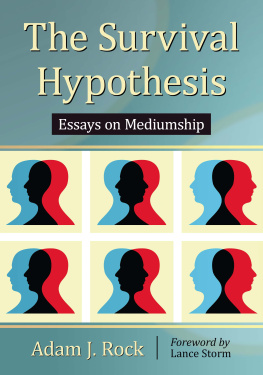
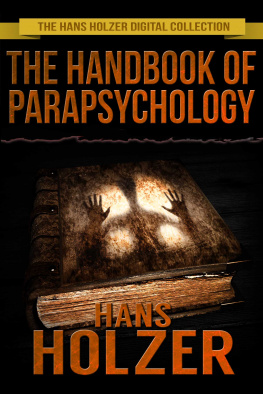
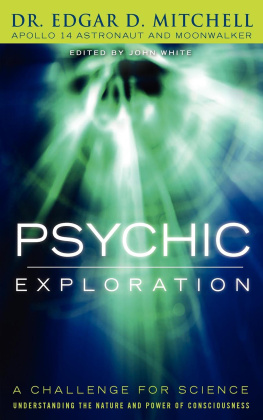
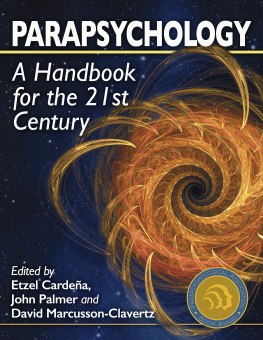
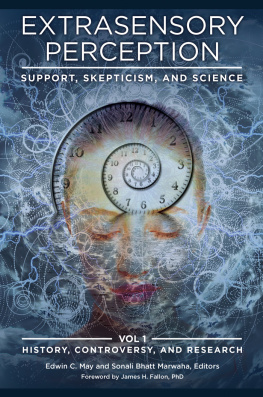
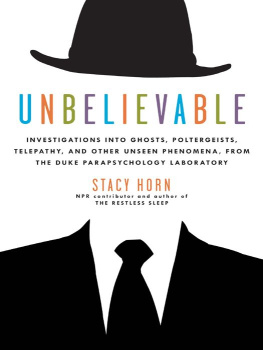
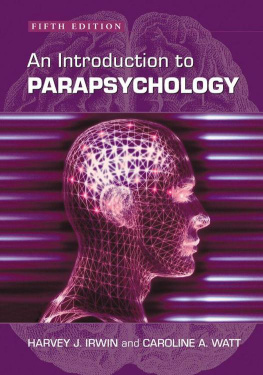
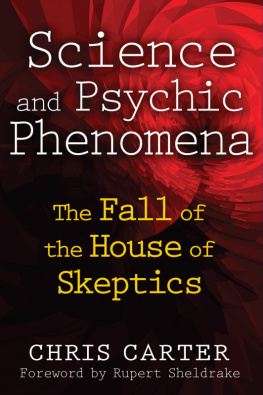

 The paper used in this publication meets the minimum
The paper used in this publication meets the minimum